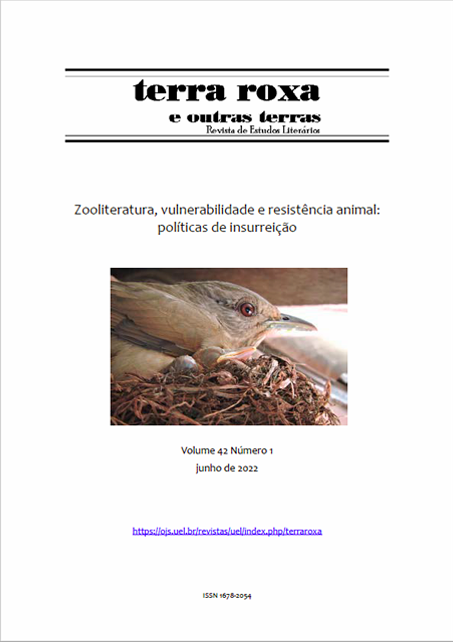Editorial
DOI:
https://doi.org/10.5433/1678-2054.2022v42p5-7Keywords:
zooliteraturaAbstract
The articles in this edition of Terra Roxa e Outras Terras discuss vulnerability, in its ontological and pathogenic configurations, with respect to the relationships between human and nonhuman animals, and address ways to resist body violation. Pathogenic vulnerability, that is, the one born from relations of oppression and exploitation, is revealed in the tortured, subjected, and murdered bodies of Carlos Drummond de Andrade’s poetry (Guida and Melo) and in Ana Paula Maia’s De gados e homens (Barros). The latter also reflects upon anti-capitalist and anti-speciesist struggles, establishing a productive dialogue with the analysis of Lygia Bojunga Nunes’ O sofá estampado (Bortoletto and Libanori), in which oppression appears both in social poverty and in the misery that stretches beyond human life. The intersection between different forms of violence also figures in the analysis of Olga Tokarczuk’s Sobre os ossos dos mortos (Drive your Plow over the Bones of the Dead) (Rodrigues and González) and João Neto’s Contos gauchescos (Copstein), books that reinforce the relation between modes of domination such as speciesism, ableism, and sexism. Finally, the subject and the notion of subjectivity are interrogated in Arce, Alkmin, Gonçalves, Melo, Costa and Guimarães, prompting the review of animality and fostering an understanding of ontological vulnerability as something which enables the encounter between bodies marked by the force of insurrection.
Downloads
References
COLLING, Sarat. Animal resistance in the global capitalist era. East Lansing: Michigan State U P, 2021. DOI: https://doi.org/10.14321/j.ctv15nbzx9
COLLING, Sarat, Sean Parson & Alessandro Arrigoni. Until all are free: total liberation through revolutionary decolonization, groundless solidarity, and a relationship framework. Counterpoints: Studies in Criticality, Bristol, 448, p. 51-73, 2014.
GILSON, Erinn C. The ethics of vulnerability: a feminist analysis of social life and practice. New York: Routledge, 2014. DOI: https://doi.org/10.1017/S2753906700001066
MATSUOKA, Atsuko & John Sorenson, orgs. Critical animal studies: towards trans-species social justice. London: Rowman & Littlefield, 2018.
WEITZENFELD, Adam & Melanie Joy. An overview of anthropocentrism, humanism, and speciesism in critical animal theory. Anthony Nocella II et al, orgs. Defining critical animal studies: an intersectional social justice approach for liberation. New York: Peter Lang, 2014. p. 3-27.
Downloads
Published
How to Cite
Issue
Section
License
Copyright (c) 2022 Angela Lamas Rodrigues, Anahí Gabriela González

This work is licensed under a Creative Commons Attribution-NonCommercial 4.0 International License.
Authors who publish in this journal agree to the following terms:
a) The authors retain the copyright and grant the journal the right of first publication, the work being simultaneously licensed under the Creative Commons Attribution-NonCommercial 4.0 International License, allowing the sharing of the work with acknowledgment of the authorship of the work and initial publication in this journal.
b) Authors are authorized to assume additional contracts separately, for non-exclusive distribution of the version of the work published in this journal (eg, publish in an institutional repository or as a book chapter), with acknowledgment of authorship and initial publication in this journal.
c) Authors are allowed and encouraged to publish and distribute their work online (e.g. in institutional repositories or on their personal page) after the editorial process, as this can generate productive changes as well as increase impact and citation of the published work (See The Effect of Open Access).
d) The authors of the approved works authorize the journal to, after publication, transfer their content for reproduction in content indexers, virtual libraries and the like.
e) The authors assume that the texts submitted for publication are of their original creation, taking full responsibility for their content in case of any objection by third parties.



















